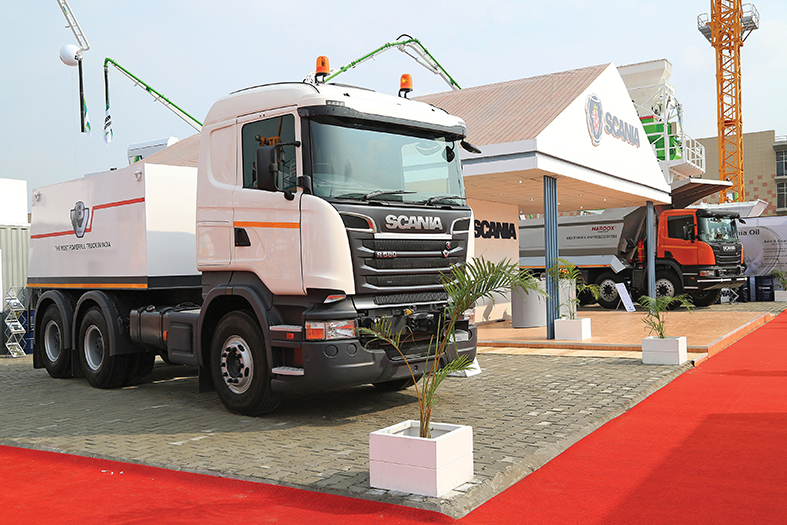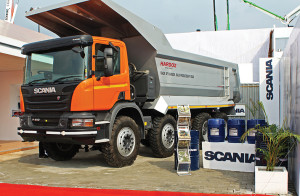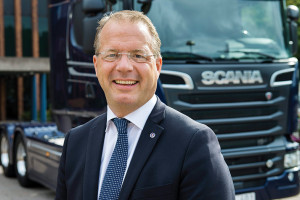Scania Commercial Vehicles India (SCVI) unleashed the country’s most powerful on-road truck – the Scania R 580 V8 (6×4) truck – at the bC India 2014 held at Greater Noida in December. Along with the première of the R 580, the Swedish vehicle maker showcased its P410 8X4 tipper with a 20 cu.m. body from SSAB, apart from other state-of-the-art products and services. Being the only major vehicle manufacturer to participate in the show, Scania made good use of the opportunity by launching Scania Oil and its enhanced telematics services, Scania Fleet Management, while also displaying two mobile workshops to highlight its flexible container concept for services and repairs in remote places.
Speaking on the occasion, Mr. Anders Grundströmer, Managing Director, Scania India and Senior Vice President, Scania Group, observed: “It is a privilege to launch our products and services at Bauma Expo. This season of Bauma Expo is very significant to Scania as we are launching India’s most powerful on-road Truck R 580 powered with V8 engine, and in addition we are updating our product portfolio with Scania P410 Tipper equipped with all-new 20 cu.m. SSAB body to withstand the toughest mining conditions. Keeping our promise of providing uncompromised service support, we are also launching Scania Oil for the first time in India to give our customers additional advantage in terms of vehicle performance and uptime. Our Fleet Management Service (FMS) was first displayed at Auto Expo 2014 in Delhi and now we are launching it for all our customers in India. With FMS, fleet operators can monitor the vehicle performance in real time, and this gives lot of scope for enhanced safety, productivity and uptime.”
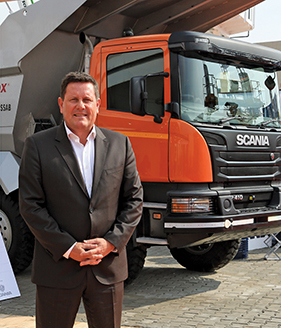
The Scania P 410 8×4 Tipper is an existing product which will now be equipped with 20 cu.m. rock body developed by one of the world’s leading producers of high-strength steel, SSAB. The tipper is a great success in the Indian mining sector. Equipped with Scania Opticruise, a fully automated gear-changing system for best fuel efficiency and ease of driving, it will now also come with an option of Idle Shutdown, a feature that further strengthens the Total Operating Economy by lowering fuel consumption. Further, the complete tipper is significantly lower in weight than the current offerings in the market, and with the increased load carrying capacity the customer is assured of significantly higher productivity.
Keeping up with the promise of unmatched aftermarket service through strong service points, Scania will now also make available the genuine Scania Oil to its customers. It is available both as engine oil and axle and gear oil. Preventing sludge and adherence, it offers protection from corrosion and wear, all leading to longer service intervals.
Ethanol bus
In August 2014, Scania had launched India’s first-ever ethanol bus when it handed over the keys of the first vehicle to Nagpur Municipal Corporation (NMC). The company is bullish about the success of its ethanol bus which can help the country leapfrog from BS III to BS V emission standard. While doubts remain over the availability of fuel for such alternate fuel vehicles, Scania has its plans charted out to get things moving in the right direction.
“Our ethanol bus was launched in Nagpur in August, and we are now concentrating on getting local fuel ready in India. It will be done in Q1 2015 when we will have ED95 fuel produced from waste in India. We will introduce a new technology in India together with our partner companies in Sweden to produce 95 per cent pure ethanol. We will be producing wet and not dry ethanol which is being used for blending in petrol”, stated Mr. Grundströmer in a media interaction at the bC India show.
If Scania succeeds in bringing in the technology required to produce ethanol or biogas in India and if waste is all that is needed, then the future looks very bright for the country, considering the thousands of tons of waste generated. For instance, Bangalore alone produces 4,000 tons of waste per day, with the number tripling in the last decade. “Today we use 94 per cent of the waste for landfills in India. This has to change. We need to take away the waste from landfills and use it for producing bio-fuels. It is an urgent need and a perfect solution to take the local waste, make local fuel and run local buses with the fuel. This is real sustainability because it is completely made in India. We see a fantastic opportunity, so the availability of fuel will not be a problem”, said Mr. Krister Thulin, Director – Presales and Marketing, SCVI.
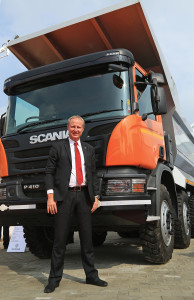
If Scania’s ethanol bus project becomes commercially viable, pollution on Indian roads will come down drastically, thanks to a whopping 90 per cent reduction in CO2 when compared to diesel buses. “Ethanol, biogas and bio-fuel are the solution to the pollution problem in Indian cities, and it is available here and now. The cost and efficiency of the engine in our vehicle is roughly the same as a diesel engine when compared to that in a hybrid or full electric technology vehicle which is significantly higher in cost”, commented Mr. Grundströmer.
In the premium inter-city bus segment as well, Scania has made significant in-roads, gaining a market share of around 25 per cent in quick time. It has been eyeing the BRT segment for long and expects its BRT products, an 18 m single articulation bus which can be extended into a 27 m double articulation vehicle, to be ready within a year and a half.
Medium- to long-term plans
The premium tipper market in India is estimated to be around 1,400 units annually, of which Scania holds a 35 per cent share. The company’s target is to maintain its share, given that the overall market size is expected to touch 5,000 units per annum by 2018.
Scania’s bus manufacturing facility, alongside its existing truck plant at Narasapura in Bangalore, is scheduled to be officially inaugurated by the end of March. The company buses are already at around 80 per cent localization in terms of value while the bus body is completely locally made. While the localization level is still only at around 25 per cent on the truck side (40 per cent local if the tipper body is included), the company is targeting a localization figure of close to 65 per cent in the coming years.
The middle of 2015 will also witness the launch of Scania’s new truck range for the on-road segment. Scania has around 30 trucks running successfully on Indian roads while it has also been studying the performance of its products through customer feedbacks during the last couple of years.
Apart from catering to the domestic market, Scania is also exploring overseas markets for its India-made trucks and buses. It has already started exporting to SAARC countries and is on the look-out for other markets. “We have been thinking about exporting our products and are already exporting trucks and buses to the SAARC countries like Bangladesh, Sri Lanka, Bhutan and Nepal. India will definitely be an export hub for Scania and, with the Indian component industry shaping up fast, we will introduce more Indian components in our vehicles as and when we are assure ourselves of quality,” said Mr. Grundströmer.
Asked whether Scania will look at entering the ‘value’ segment sometime in future, Mr. Grundströmer responded by saying: “We are in no hurry because we always focus on the long term. We are not here for just a couple of years; we are here for the rest of our lives. We have time and we will not compromise on quality or on our brand, and we will continue operating in the premium segment. Let the others experiment with what they do, we will follow our business style because we think we are right.”
|
Martin Lundstedt to lead ACEA Commercial Vehicle Board for 2015 The Commercial Vehicle Board of Directors of the European Automobile Manufacturers’ Association (ACEA) has elected Mr. Martin Lundstedt as its new Chairman for 2015. Mr. Lundstedt, President and CEO of Scania, succeeds Mr. Wolfgang Bernhard, Head of Daimler Trucks, who took over chairmanship of ACEA’s Commercial Vehicle Board in 2013, and went on to serve a second term in 2014. |
